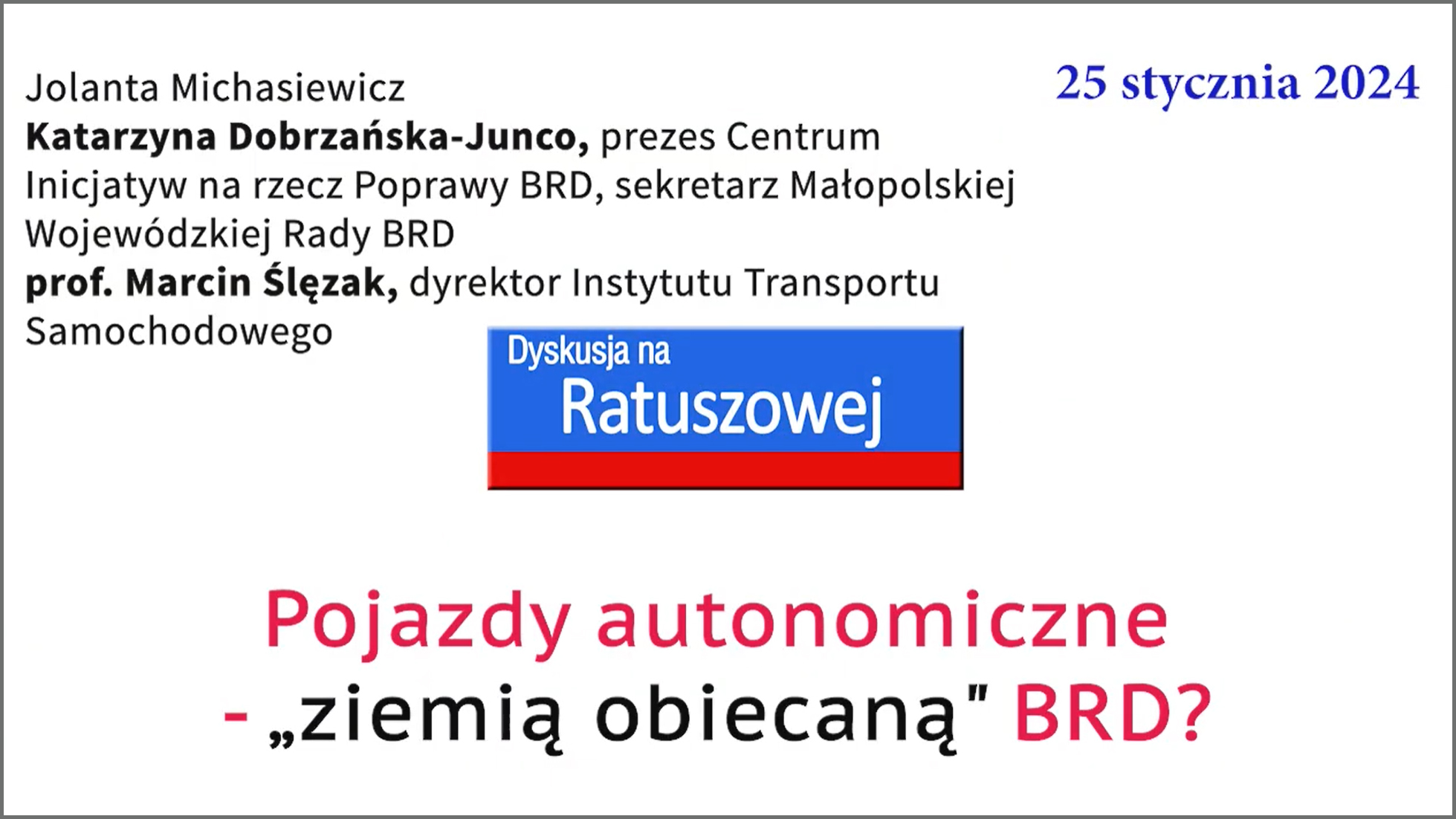Blog
Autonomous vehicles: opportunity or threat?
On January 26, 2024, as part of the series of debates ” Discussion at Ratuszowa Street”, an expert meeting dedicated to issues related to autonomous vehicles was held. The debate was attended by: Katarzyna Dobrzańska-Junco from the Małopolska Road Safety Council and prof. Marcin Ślęzak, director of the Motor Transport Institute (ITS), head of the Connected and Autonomous Vehicles Competence Centre (CK:PAP). The moderator of the discussion was editor Jolanta Michasiewicz from the Prawa Drogowe News portal. Prof. Marcin Ślęzak drew attention to the fact that the Motor Transport Institute actively participates in the discourse on autonomous vehicles, including: organizing a series of “AV-POLAND” conferences since 2017, presenting the latest solutions in this area. The professor also discussed the principle of operation and construction of automated vehicles, pointing to 2030 as the conventional date for the popularization of AI and CAD technologies (Artificial Intelligence, Connected Automated Driving). According to prof. Ślęzak, the advantages and disadvantages of autonomous vehicles will change as the technology develops. Research shows that humans are responsible for over 90 percent of road accidents. Eliminating this “weak link” can significantly improve safety because artificial intelligence will be devoid of human flaws (physical and psychological). Fewer road accidents also mean lower costs for the economy, which in Poland currently amount to approximately PLN 40 billion per year. In an interview with the editorial office of Praw Drogowe News, prof. Ślęzak also sees potential disadvantages of autonomous vehicles, such as:
The professor also drew attention to the ultimate possibility of “slimming” autonomous vehicles due to the lower risk of involvement in future accidents and the resulting possibility of reducing some of the controlled crumple zones to result in a lighter body structure. An important aspect in the development of autonomous vehicles is the creation of a favorable legal environment. Prof. Ślęzak emphasized that experts from the Connected and Autonomous Vehicles Competence Centre (CK:PAP) have been participating in international meetings on this topic for years, but the creation of law at the European level is quite slow. The subsequent implementation of these regulations into the national legal system is also important. In Poland, the competent authority responsible for ensuring road safety is the Ministry of Infrastructure. Prof. Ślęzak also drew attention to moral issues related to autonomous vehicles, which vary depending on the region of the world and cultural patterns. Artificial intelligence can be programmed for specific markets, which may lead to different solutions in Europe and, for example, the United States. Another issue discussed was liability for accidents involving autonomous vehicles. In this case, responsibility may be blurred and apply to everyone, whether the vehicle, the manufacturer, the service provider, the programmer, or even the passenger. Prof. Ślęzak emphasized that autonomous vehicles should be available to everyone, but not everyone has to own them. In the future, we may observe the development of public transport based on “intelligent vehicles”, supplemented by individual transport in the form of rental companies. In the professor’s opinion, in times of shortage of professional drivers or in areas where the work of a professional driver is tiring or dangerous, CAD is a panacea for the current problems of the transport industry. Katarzyna Dobrzańska-Junco agreed that the full introduction of autonomous vehicles to the market is still distant, which gives time to refine the technology. She emphasized that eliminating the human factor from transport can significantly improve safety, but new problems that may arise should also be taken into account. The representative of the Małopolska Road Safety Council also drew attention to the transition period in which people will increasingly rely on technologies supporting driving, which may lead to excessive trust and neglect of manual driving skills. The expert emphasized that mobility is evolving and we must be ready for it. She mentioned that the UN Transport Committee is working on a law regarding automated vehicles, and the United States has already introduced regulations in this area. Katarzyna Dobrzańska-Junco also drew attention to the problem of fuzzy liability in the case of accidents involving autonomous vehicles. She also pointed to moral dilemmas related to algorithms making decisions in extreme situations. To sum up, experts agreed that autonomous vehicles have great potential, but there are still many challenges ahead. Further research and knowledge exchange are needed to prepare for a future of mobility when autonomous vehicles will play a key role. |


